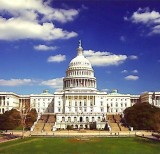
Political Interference

Top 400 Taxpayers See Tax Rates Rise, But There’s More to the Story
As Americans were gathering party supplies to greet the New Year, the Internal Revenue Service released their annual report of cumulative tax data reported on the 400 tax r...
read in full
Chlorine Bleach Plants Needlessly Endanger 63 Million Americans
Chlorine bleach plants across the U.S. put millions of Americans in danger of a chlorine gas release, a substance so toxic it has been used as a chemical weapon. Greenpeace’s new repo...
read in full
U.S. Industrial Facilities Reported Fewer Toxic Releases in 2014
The Toxics Release Inventory (TRI) data for 2014 is now available. The good news: total toxic releases by reporting facilities decreased by nearly six percent from 2013 levels. Howe...
read in full
Methane Causes Climate Change. Here's How the President Plans to Cut Emissions by 40-45 Percent.
UPDATE (Jan. 22, 2016): Today, the Bureau of Land Management (BLM) released its proposed rule to reduce methane emissions...
read in full
Living in the Shadow of Danger: Poverty, Race, and Unequal Chemical Facility Hazards
People of color and people living in poverty, especially poor children of color, are significantly more likely...
read in full
A Tale of Two Retirements: One for CEOs and One for the Rest of Us
The 100 largest CEO retirement funds are worth a combined $4.9 billion, equal to the entire retirement account savings of 41 percent of American fam...
read in full
Gasping for Support: Implementation of Tougher Air Quality Standards Will Require New Funds for State Agencies
New scientific research shows that the current levels of...
read in full



 Though the Clean Air Act and rules from the U.S. Environmental Protection Agency (EPA) have reduced national air pollution levels, hundreds of communities around the country still struggle with dangerously poor air quality. Released on Nov. 7,
Though the Clean Air Act and rules from the U.S. Environmental Protection Agency (EPA) have reduced national air pollution levels, hundreds of communities around the country still struggle with dangerously poor air quality. Released on Nov. 7, 



 The Regulatory Accountability Act (RAA), announced by Sens. Rob Portman (R-OH), Mark Pryor (D-AR), and Susan Collins (R-ME) and Reps. Lamar Smith (R-TX) and Collin Peterson (D-MN) on Sept. 22, is a radical overhaul of the federal rulemaking process that would result in a system that allows powerful special interests to dominate. The bill would cast aside public health, worker safety, and environmental quality goals that are the basis of so many public protections and make estimated costs to businesses and the economy the most important consideration in rulemaking.
The Regulatory Accountability Act (RAA), announced by Sens. Rob Portman (R-OH), Mark Pryor (D-AR), and Susan Collins (R-ME) and Reps. Lamar Smith (R-TX) and Collin Peterson (D-MN) on Sept. 22, is a radical overhaul of the federal rulemaking process that would result in a system that allows powerful special interests to dominate. The bill would cast aside public health, worker safety, and environmental quality goals that are the basis of so many public protections and make estimated costs to businesses and the economy the most important consideration in rulemaking. When the 112th Congress convened, it agreed to a
When the 112th Congress convened, it agreed to a 


